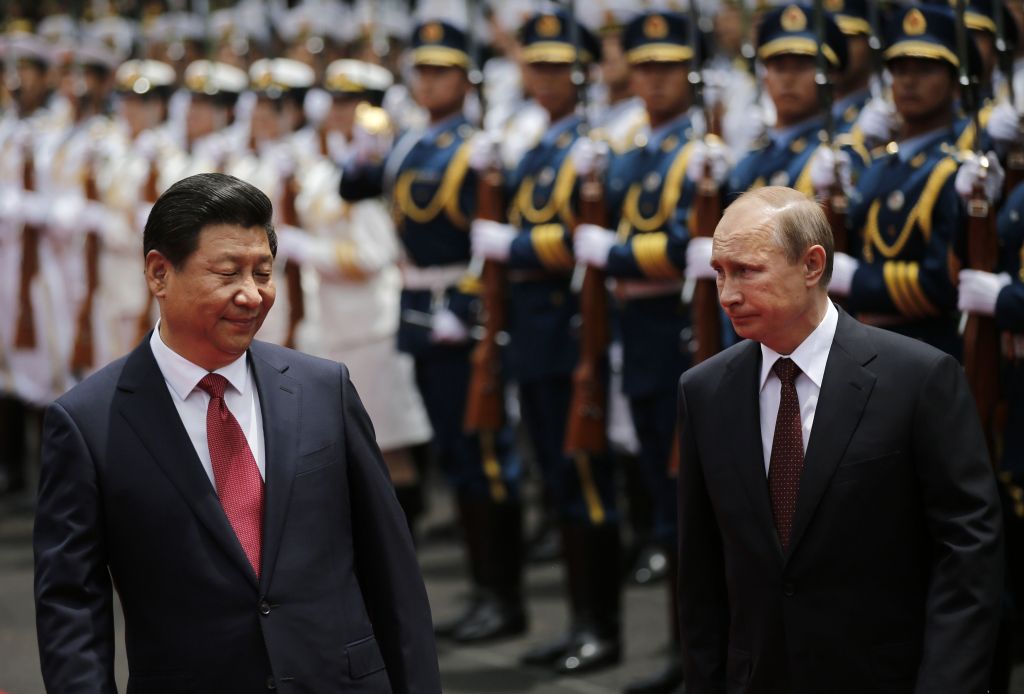China and Russia started joint naval exercises off Shanghai on Tuesday as their leaders promised to strengthen relations in the face of international criticism over their territorial disputes.
President Xi Jinping launched the drills at a ceremony in a room lined with officers of both navies in white dress uniform, with his Russian counterpart Vladimir Putin looking on, state broadcaster CCTV showed.
Putin’s visit — his first since Xi took office last year — comes as Moscow’s relations with the United States and European Union have plunged to a post-Cold War low over its seizure of Crimea and Western accusations Russia is fomenting unrest in eastern Ukraine.
At the same time Beijing is quarrelling with neighbours — including Vietnam, Japan and the Philippines — over territorial disputes.
Beijing says a combined 14 surface ships from both countries will take part in the week-long drills in the East China Sea which are aimed at a “maritime threat” and include live-fire exercises.
The exercises show “the unshakable determination and will of China and Russia to together face new threats and challenges to protect regional security and stability”, Xi was quoted as saying by the government-backed China News Service.
Putin said he hoped “the two militaries can strengthen cooperation under the new situation”, it added.
It is the third time in as many years that the two countries have held naval exercises near China’s coast, according to state media.
“The Chinese are much more agitated about what happens on the sea and one sees support there from Russia,” said Raffaello Pantucci, senior research fellow at the Royal United Services Institute for Defence and Security Studies.
“The Russians want support on the international stage to grandstand,” he added.
Relations between China and Vietnam have worsened after Beijing’s move earlier this month to send a deep-water oil drilling rig into contested waters in the South China Sea, sparking violent Vietnamese protests in which two Chinese were killed.
China and Japan have a long-running feud over disputed islands in the East China Sea, while the Philippines accuses China of reclaiming land on a disputed reef within its exclusive economic zone under a UN convention.
‘My old friend’
China and Russia are both veto-wielding members of the United Nations Security Council, are regularly criticised by human rights groups, and have often worked together to counter the United States on a range of issues.
They were at times close allies during the Cold War, when China and the then-Soviet Union were both communist-ruled.
Russia said Monday it had ordered troops near the border with Ukraine to return to their bases. The move could ease tensions, but the United States and military alliance NATO said they saw no sign of a withdrawal.
Xi, who called Putin “my old friend” as they met for talks, said building a strategic partnership was a necessary choice for building a multi-polar world, the official Xinhua news agency reported.
Putin called for boosting bilateral trade to $100 billion by 2015, up from nearly $90 billion last year, through cooperation in the aviation, aerospace, manufacturing and energy sectors, it said.
The two countries signed a “large” group of agreements in the energy, electric power, aviation and communications sectors, state media said.
But a natural gas agreement which had been touted by officials remained elusive, Xinhua said, with Putin citing “significant” progress in talks to export natural gas to energy-hungry China as his country diversifies from the European market.
The Chinese and Russian leaders will on Wednesday attend the formal opening of the Conference on Interaction and Confidence Building Measures in Asia, a little-known Asian security forum.










